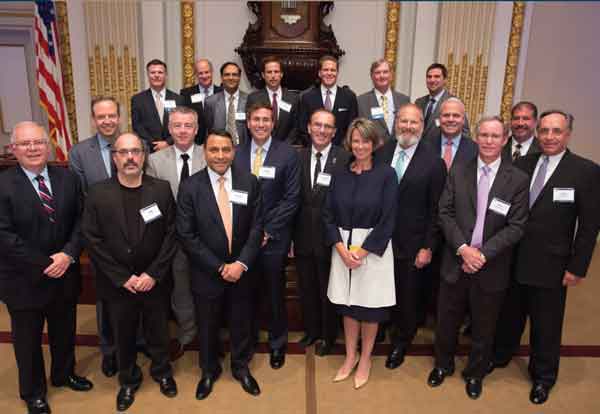 More than ever before, CFOs are being called upon to stretch the finance chief role far beyond crunching numbers—and for good reason. Traditional finance-team functions like tracking and reporting results, allocating capital, ensuring control and compliance and supporting decision-making have always been critical components of business strategy. But today’s increasingly complex and competitive business environment demands that CFOs work even more closely with their CEOs in charting a strategic course and steering the company along it.
More than ever before, CFOs are being called upon to stretch the finance chief role far beyond crunching numbers—and for good reason. Traditional finance-team functions like tracking and reporting results, allocating capital, ensuring control and compliance and supporting decision-making have always been critical components of business strategy. But today’s increasingly complex and competitive business environment demands that CFOs work even more closely with their CEOs in charting a strategic course and steering the company along it.
Take Zurich North America, an insurance firm currently seeking a CFO. “I’m looking for a business partner,” CEO Daniel Riordan told participants in a recent roundtable discussion held in partnership with the American Institute of Certified Public Accountants (AICPA) and the Chartered Institute of Management Accountants (CIMA). “I’m looking for someone who can create a non-siloed environment where we bring an entire executive team together to face growing challenges.”
Like many companies, Zurich faces regulatory requirements, tax considerations and cyber security threats. Still, Riordan shuns the notion of an office-bound CFO toiling behind the scenes to churn out financial reports and control costs. “I want a marketfacing CFO,” he asserts. “One who is comfortable in his own skin dealing with customers, being out in the marketplace, standing in for me or for sales—to be the face of the company. That’s very, very important.”
It’s a sentiment that resonates with Arleen R. Thomas, senior vice president of management accounting and global markets at the American Institute of Certified Public Accountants (AICPA), who notes that her organization recently surveyed 300 CEOs on current global challenges and top priorities. “Seventy-six percent of respondents said that they were spending too much time on the financial system and financial reporting,” she said. “Seventy-five percent said, ‘If we could spend more time measuring and demonstrating the nonfinancial value of our businesses, we would be in a better place.’ The bottom line is that the CFO of today and the CFO of the future need to bridge their knowledge from finance to include a more holistic view and all aspects of the business.”
Intensifying regulatory scrutiny, rampant mergers and acquisitions, shareholder activism, increasingly demanding customers and cyber security threats represent a wide range of factors contributing to the need for this broader interpretation of the traditional CEO role. Still, it can be tough to achieve, noted Kurt Schneider, CEO at Harlem Globetrotters. “Our CFO comes from an accounting background and is great at generating reports,” he said. “That doesn’t help our operating guys because they’re trying to live in the future and he’s trying to justify the present by reporting on the past. So we’re focusing on trying to find the vision of where we want to go and work toward that.”


0

1:00 - 5:00 pm
Over 70% of Executives Surveyed Agree: Many Strategic Planning Efforts Lack Systematic Approach Tips for Enhancing Your Strategic Planning Process
Executives expressed frustration with their current strategic planning process. Issues include:
Steve Rutan and Denise Harrison have put together an afternoon workshop that will provide the tools you need to address these concerns. They have worked with hundreds of executives to develop a systematic approach that will enable your team to make better decisions during strategic planning. Steve and Denise will walk you through exercises for prioritizing your lists and steps that will reset and reinvigorate your process. This will be a hands-on workshop that will enable you to think about your business as you use the tools that are being presented. If you are ready for a Strategic Planning tune-up, select this workshop in your registration form. The additional fee of $695 will be added to your total.

2:00 - 5:00 pm
Female leaders face the same issues all leaders do, but they often face additional challenges too. In this peer session, we will facilitate a discussion of best practices and how to overcome common barriers to help women leaders be more effective within and outside their organizations.
Limited space available.

10:30 - 5:00 pm
General’s Retreat at Hermitage Golf Course
Sponsored by UBS
General’s Retreat, built in 1986 with architect Gary Roger Baird, has been voted the “Best Golf Course in Nashville” and is a “must play” when visiting the Nashville, Tennessee area. With the beautiful setting along the Cumberland River, golfers of all capabilities will thoroughly enjoy the golf, scenery and hospitality.
The golf outing fee includes transportation to and from the hotel, greens/cart fees, use of practice facilities, and boxed lunch. The bus will leave the hotel at 10:30 am for a noon shotgun start and return to the hotel after the cocktail reception following the completion of the round.